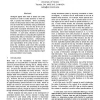796 search results - page 77 / 160 » The canonical function game |
APPROX
2007
Springer
14 years 2 months ago
2007
Springer
Abstract Consider a situation where a group of agents wishes to share the costs of their joint actions, and needs to determine how to distribute the costs amongst themselves in a f...
EOR
2010
13 years 7 months ago
2010
Cooperation structures without any a priori assumptions on the combinatorial structure of feasible coalitions are studied and a general theory for marginal values, cores and conve...
AI
2004
Springer
14 years 1 months ago
2004
Springer
The fitness function of an evolutionary algorithm is one of the few possible spots where application knowledge can be made available to the algorithm. But the representation and u...
IJCAI
2003
13 years 9 months ago
2003
Intelligent agents often need to assess user utility functions in order to make decisions on their behalf, or predict their behavior. When uncertainty exists over the precise natu...
AGS
2009
Springer
14 years 2 months ago
2009
Springer
Abstract. The importance of affect in delivering engaging experiences in entertainment and education is well recognized. We introduce the Koko architecture, which describes a servi...

